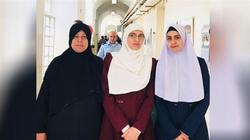 An Israeli court has ruled that three Palestinian female activists are no longer allowed to stay in the vicinity of a gate of the al-Aqsa Mosque compound in the occupied Old City of East Jerusalem al-Quds.
An Israeli court has ruled that three Palestinian female activists are no longer allowed to stay in the vicinity of a gate of the al-Aqsa Mosque compound in the occupied Old City of East Jerusalem al-Quds. RNA - The court in Jerusalem al-Quds issued a verdict at the request of the Israeli police, preventing Palestinian activists Hinadi al-Halawani, Aida Sidawi and Madlin Issa from approaching the complex’s al-Silsila (Chain) Gate not closer than 200 meters for the next 60 days.
The verdict came after the three activists were protesting on a daily basis at the gate against an earlier court ruling, which had prevented them from entering the al-Aqsa Mosque for several months.
The Palestinian women were banned from entering the compound for their role in defending the holy site against Israeli settlers’ almost regular violations.
The al-Aqsa Mosque compound sits just above the Western Wall plaza and houses both the Dome of the Rock and the al-Aqsa Mosque. Israel's extremist settlers seek to build a Jewish temple on the site. They refer to the area around the mosque as “The Temple Mount.”
Hardline Israeli legislators also regularly violate the al-Aqsa Mosque compound in the occupied city, a provocative move that infuriates Palestinians.
According to an agreement signed between Israel and the Jordanian government after Israel’s occupation of East Jerusalem al-Quds in 1967, non-Muslim worship at the compound is prohibited.
On Wednesday, Ismail Haniyeh, the head of Hamas’ Political Bureau, warned that the Israeli regime was executing three dangerous plots against the compound.
First, it allows settlers to perform their Jewish rituals inside the site, which is banned. At the same time, it gradually turns non-Muslim worship into an indispensable religious right granted to the settlers.
The second plot, he added, is the Israeli regime is increasingly undermining the role of guards at the al-Aqsa Mosque by keeping them as far away from the complex as it can so that the settlers can freely hold guided tours there.
Haniyeh noted that the third plot is changing the character of the Israeli-restricted Bab al-Rahma area of the complex. "
"Today we see Israeli settlers are allowed to enter the site but Muslims are banned from entering and saying their prayers inside the site," he said.
Bab al-Rahma, with a gate of the same name, consists of a large building and a courtyard that is located to the east of the al-Aqsa Mosque compound.
The al-Aqsa Mosque compound is a flashpoint, highly respected by Muslims, Jews, and Christians alike. The mosque is Islam’s third holiest site after Masjid al-Haram in Mecca and Masjid al-Nabawi in Medina.